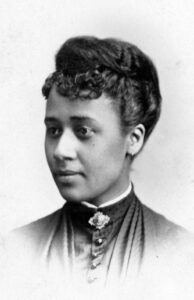This month, we’re celebrating influential Black leaders who have improved social emotional learning opportunities for all students.
“True progress is never made by spasms. Real progress is growth. It must begin in the seed.”
Who was Anna Julia Cooper?
Born in 1858 in Raleigh, North Carolina, Anna Julia Cooper was an American teacher, scholar and writer. Her natural teaching ability can be seen as early as age 10, when she started tutoring students in mathematics in addition to completing her own studies.
In 1868, Cooper enrolled at Saint Augustine’s Normal School and Collegiate Institute (now Saint Augustine’s University). There, she experienced a feminist awakening which was her catalyst in advocating for the education of neglected people, especially Black women. She would later become known as ‘The Mother of Black feminism’, with her first book “A Voice from the South: By a Black Woman of the South”, written in 1892, becoming widely recognized as the first written iteration of Black feminism.
In the 1890s, Cooper became a prominent speaker in the Black women’s club movement. This was a movement with members who were generally well educated middle-class women and believed it was their duty to help less fortunate African Americans. Her speeches in this movement typically focused on the importance of granting access to high quality education for Black women and on equality for Black people as a whole.
Cooper gained national attention through her books and lectures on topics such as education, civil rights, and the lives of Black women. Then, in 1902, she became the principal at M Street High School, (established in 1870 as the Preparatory High School for Negro Youth). During her tenure, she strengthened academic standards within the school which led to several of her students winning scholarships to Ivy League colleges. Contrary to what many other schools were doing, she led M Street High School with a focus on preparing Black students for college, not just trade work. However, this approach was seen as controversial, and she was forced to resign in 1906.
Steadfast and determined, Cooper continued to pave the way for more equitable education. She continued her teaching, this time at Lincoln University, a historically black college in Jefferson City, MO. Then, in 1910, she returned to M Street High School and stayed there until 1930. She later went on to pursue a doctoral degree at the University of Paris in France, eventually becoming the fourth African American woman to achieve a doctorate of philosophy in 1925.
Anna Julia Cooper’s Lasting Impact on Education
Anna Julia Cooper’s work – through her teaching, writing, and public speaking – helped pave the way for a more equitable and just education system. She challenged the boundaries of race and gender for herself; but more importantly, for other ‘neglected peoples’.
Cooper’s advocacy for all people having a right to an education helped redefine perceptions of, and opportunities for Black women. In an effort to honor her work, The Anna Julia Cooper Center exists to ‘support, generate, and communicate innovation at the intersections of gender, race, and place’.
Education has the power to have a lasting impact on children and to shape their future. Appreciating diversity, appreciating differences, and respecting others are all essential components of a school that help drive long-term success for students. Cooper’s leadership, resiliency, and motivation helped ensure that these themes are a priority in schools.
As we celebrate the impact of influential Black leaders in education this month, we give gratitude for Anna Julia Cooper. Join us for a deep breath of gratitude for her work, impact, and ever-growing legacy.
How are you celebrating Black History Month? Share this article on social media to celebrate Anna Julia Cooper, and let us know who else you are learning about this month!











